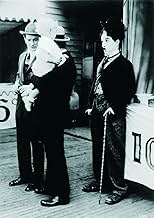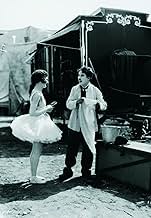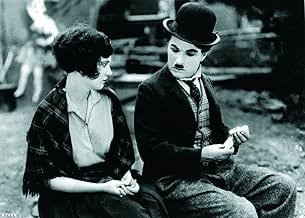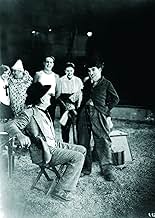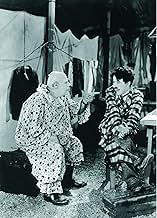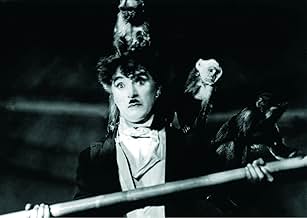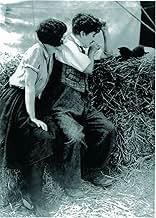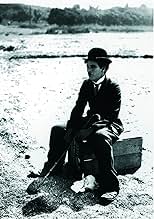IMDb-BEWERTUNG
8,1/10
37.644
IHRE BEWERTUNG
Der Tramp findet Arbeit bei einem Zirkus und das Mädchen seiner Träume.Der Tramp findet Arbeit bei einem Zirkus und das Mädchen seiner Träume.Der Tramp findet Arbeit bei einem Zirkus und das Mädchen seiner Träume.
- Regie
- Drehbuch
- Hauptbesetzung
- Auszeichnungen
- 3 wins total
Charles Chaplin
- A Tramp
- (as Charlie Chaplin)
Al Ernest Garcia
- The Circus Proprietor and Ring Master
- (as Allan Garcia)
Tiny Sandford
- The Head Property Man
- (as Stanley J. Sandford)
Albert Austin
- Clown
- (Nicht genannt)
Chester A. Bachman
- Cop
- (Nicht genannt)
Eugene Barry
- Cop
- (Nicht genannt)
Jack Bernard
- Man in Circus Audience
- (Nicht genannt)
Stanley Blystone
- Cop
- (Nicht genannt)
Heinie Conklin
- Clown
- (Nicht genannt)
Toraichi Kono
- Man in Circus Audience
- (Unbestätigt)
- (Nicht genannt)
H.L. Kyle
- Man in Circus Audience
- (Nicht genannt)
Betty Morrissey
- The Vanishing Lady
- (Nicht genannt)
Empfohlene Bewertungen
The Circus is probably Chaplin's most underrated film. It is (easily) one of the funniest movies ever, and the inventiveness of such shots as the Mirror Maze scene and the closing sequence are nothing less than brilliant. What separates Chaplin from other comedian filmmakers is his ability to evoke a sense of pity and/or sympathy for his character. How can you watch the closing scenes of this film and, even after all of the laughter, NOT sense a bit of melancholia welling up in your heart? Truly one of the greats.
I enjoyed this a lot more the second time when I could see it on a very clear DVD print. I don't know why that would make a difference with the story, but it did as I found it very good for the entire distance, although that's just a scant 69 minutes.
In the story, Charlie Chaplin does his normally-great physical slapstick so well that he accidentally becomes a hit at the circus, which is run by a nasty man (Allan Garcia) who regularly beats his sweet step-daughter, played by a very pretty Merna Kennedy. Charlie, of course, gets smitten by her and comes to her rescue.
This movie has a different kind of ending that what you'd normally see for a comedy but it's inspiring as Chaplin performs a noble deed. (However, Kennedy's character is in question as she seems satisfied to marry either of two men. Huh?)
Chaplin's timing and clever slapstick routines never fail to amaze me. Even though silent films aren't seen by many people these days, it's works of art like this that will endure forever. This is not of one of Chaplin's more famous movies.....but it should be. I think it's one of his best.
In the story, Charlie Chaplin does his normally-great physical slapstick so well that he accidentally becomes a hit at the circus, which is run by a nasty man (Allan Garcia) who regularly beats his sweet step-daughter, played by a very pretty Merna Kennedy. Charlie, of course, gets smitten by her and comes to her rescue.
This movie has a different kind of ending that what you'd normally see for a comedy but it's inspiring as Chaplin performs a noble deed. (However, Kennedy's character is in question as she seems satisfied to marry either of two men. Huh?)
Chaplin's timing and clever slapstick routines never fail to amaze me. Even though silent films aren't seen by many people these days, it's works of art like this that will endure forever. This is not of one of Chaplin's more famous movies.....but it should be. I think it's one of his best.
Although movie buffs seldom mention `The Circus' in the same breath as Charlie Chaplin's more touted masterpieces (`City Lights,' `Modern Times,' `The Gold Rush'), this film contains some of his best work manifested in a number of ingenious sequences. Chaplin once again dons the role of the tramp, this time having all sorts of adventures (and misadventures) under the big top.
In order to evade the police who suspect him of being a thief, the tramp ducks into a circus tent and acts as if he is part of the show. The cops follow him into the tent and try to apprehend him, with comical results. The crowd goes wild, believing all this was planned ahead of time. The audience's reaction is so strong that the tyrannical circus owner hires him on the spot. When it is discovered that Chaplin cannot be funny intentionally, the owner gives him a job as a prop man, clumsily lugging equipment around the tent as part of the show. Again the crowd roars its approval at his inadvertent antics, and soon the tramp is the circus' main attraction. In the meantime, he falls in love with the owner's daughter, a bareback rider who herself loves the tightrope walker, and romantic complications ensue.
`The Circus' is an all-around Chaplin effort. In addition to playing the lead role, he wrote, directed, produced and edited it, and composed the music as well. It is a meticulous production on all counts, with each sequence choreographed to elicit the maximum capacity of laughter from the audience. The scenes in which the tramp is pursued through a hall of mirrors, trapped inside the lion's cage, and forced to double for the missing tightrope walker stand alongside his finest achievements. The ending sequence is especially heartrending, as many are in his films. Here is a movie to be cherished by all fans of Chaplin, but appreciated even by casual viewers. This is because it achieves a rare blend of comedy and poignancy through appealing, sympathetic characters and with genuine honesty adding a note of realism to counterbalance the clowning.
In order to evade the police who suspect him of being a thief, the tramp ducks into a circus tent and acts as if he is part of the show. The cops follow him into the tent and try to apprehend him, with comical results. The crowd goes wild, believing all this was planned ahead of time. The audience's reaction is so strong that the tyrannical circus owner hires him on the spot. When it is discovered that Chaplin cannot be funny intentionally, the owner gives him a job as a prop man, clumsily lugging equipment around the tent as part of the show. Again the crowd roars its approval at his inadvertent antics, and soon the tramp is the circus' main attraction. In the meantime, he falls in love with the owner's daughter, a bareback rider who herself loves the tightrope walker, and romantic complications ensue.
`The Circus' is an all-around Chaplin effort. In addition to playing the lead role, he wrote, directed, produced and edited it, and composed the music as well. It is a meticulous production on all counts, with each sequence choreographed to elicit the maximum capacity of laughter from the audience. The scenes in which the tramp is pursued through a hall of mirrors, trapped inside the lion's cage, and forced to double for the missing tightrope walker stand alongside his finest achievements. The ending sequence is especially heartrending, as many are in his films. Here is a movie to be cherished by all fans of Chaplin, but appreciated even by casual viewers. This is because it achieves a rare blend of comedy and poignancy through appealing, sympathetic characters and with genuine honesty adding a note of realism to counterbalance the clowning.
The Little Tramp is chased into a circus tent during a performance; his antics prove funnier than those of the clowns, and the ringmaster hires him for the show.
When a comedian plays a character who is inadvertently hilarious, it can seem narcissistic: just check out Jerry Lewis's "The Errand Boy" where Lewis has his supporting cast praise the comic genius of the character played by Jerry Lewis. Despite this danger, and despite Chaplin's off-screen egotism, the premise plays beautifully, especially since The Little Tramp (though not Chaplin) is such a terrible comedian when he's trying to be one. My favorite moment is when the ringmaster demands the auditioning Tramp to be funny right that instant: the Tramp grins and shyly dances around a bit, gingerly falls down, puts his cane between his legs and meekly lifts himself back up. "Terrible!" roars his would-be employer.
This film has more self-awareness over comedy conventions that any other Chaplin I know of. The Tramp ineptly (but hilariously) performs a couple of standard comedy routines with the other circus clowns. Later, there's a funny twist to the old banana peel gag; and near the end he crashes into an old general store, looking as if he's thrust himself back into his old Keystone days. This is Chaplin's last true silent film, and the Keystone moment feels like a nostalgic farewell to the past.
"The Circus" is funny throughout, but the opening scenes are probably the best. There's a marvelous funhouse sequence and a priceless routine where The Tramp pretends to be a motorized dummy. (Has anyone seen the Swiss clock routine from "Your Show of Shows"?) He also falls in love with the ringmaster's cruelly treated daughter, which leads to a poignant ending.
I enjoyed the music, which Chaplin composed for this film in 1969. His scores are always repetitive; but they're also sweet and funny and they enhance the action. I could have done without the title-sequence song (which he sings himself)—something about looking up at rainbows. Otherwise, this comedy is near-perfect and holds its own against Chaplin's even greater features, "The Gold Rush," "City Lights" and "Modern Times."
When a comedian plays a character who is inadvertently hilarious, it can seem narcissistic: just check out Jerry Lewis's "The Errand Boy" where Lewis has his supporting cast praise the comic genius of the character played by Jerry Lewis. Despite this danger, and despite Chaplin's off-screen egotism, the premise plays beautifully, especially since The Little Tramp (though not Chaplin) is such a terrible comedian when he's trying to be one. My favorite moment is when the ringmaster demands the auditioning Tramp to be funny right that instant: the Tramp grins and shyly dances around a bit, gingerly falls down, puts his cane between his legs and meekly lifts himself back up. "Terrible!" roars his would-be employer.
This film has more self-awareness over comedy conventions that any other Chaplin I know of. The Tramp ineptly (but hilariously) performs a couple of standard comedy routines with the other circus clowns. Later, there's a funny twist to the old banana peel gag; and near the end he crashes into an old general store, looking as if he's thrust himself back into his old Keystone days. This is Chaplin's last true silent film, and the Keystone moment feels like a nostalgic farewell to the past.
"The Circus" is funny throughout, but the opening scenes are probably the best. There's a marvelous funhouse sequence and a priceless routine where The Tramp pretends to be a motorized dummy. (Has anyone seen the Swiss clock routine from "Your Show of Shows"?) He also falls in love with the ringmaster's cruelly treated daughter, which leads to a poignant ending.
I enjoyed the music, which Chaplin composed for this film in 1969. His scores are always repetitive; but they're also sweet and funny and they enhance the action. I could have done without the title-sequence song (which he sings himself)—something about looking up at rainbows. Otherwise, this comedy is near-perfect and holds its own against Chaplin's even greater features, "The Gold Rush," "City Lights" and "Modern Times."
10lugonian
THE CIRCUS (United Artists, 1928) written, produced, directed and starring Charlie Chaplin, is a well-documented gem about circus life, mixing comedy and sentiment in the best Chaplin tradition, ranking this one of his finer yet neglected achievements of the 1920s.
In it, Chaplin plays a tramp who drifts at the midway of the circus after being wrongly accused of a theft and chased by a policeman. His escapades are mistaken as part of the act, which stirs roars of laughter from its audience. Because his circus has not been earning any profits, the ringmaster/owner (Allan Garcia) decides in hiring Charlie as his top attraction. However it is learned that Charlie is only funny whenever he blunders to his viewing public. Charlie soon learns from the abused Merna (Merna Kennedy), how valuable he really is, thus, making demands of quitting to his employer unless he ceases mistreating his stepdaughter, and offers him a higher salary, which he does. All goes well until Rex (Henry Crocker), "King of the High Wire," joins the circus and becomes attracted to Merna, causing Charlie to vie for her affections any which way he can.
With the circus being one of the more famous backdrops of many movie comedians and/or comedy teams ranging from W.C. Fields to Laurel & Hardy, The Marx Brothers to Martin and Lewis, THE CIRCUS stands out more for its ingenious use of difficult gags, comic timing and the effort that went into it to make every gag funny as well as realistically done. Rarely seen since its original theatrical release, THE CIRCUS came into full view again shortly after Chaplin's death in 1977. Newly scored and restored by Chaplin himself in 1968 (as mentioned in the new opening titles), with his singing of "Swing Little Girl" recorded on the soundtrack during the opening credits, my first experience with THE CIRCUS was in 1980 at New York City's Regency Theater, 68th Street and Broadway, where the revival theater (which no longer exists, having been demolished in 1998) paid a tribute to Chaplin with a series of shorts and features, including THE KID (1921), MODERN TIMES (1936) and THE GREAT DICTATOR (1940). Being surrounded by an appreciative audience laughing at a silent film made long ago indicated d THE CIRCUS has stood the test of time and what a comic genius Chaplin was, especially when demonstrating how difficult performing comedy can be as his character finds he has to be funny and isn't, and at the same time showing how poor he is as a comic to the circus staff and how funny he is as a bad comedian to the movie audience. While sitting in the dark movie theater of all ages at the Regency, the biggest laughs occurred during the opening as Chaplin hides from the law inside a fun house surrounded by mirrors and later making a fool out of the rival pickpocket (Steve Murphy) as they each attempt to fool the policeman by pretending to be movable statues; Charlie's encounter with a lion while locked inside the cage; and the biggest topper of all being Charlie doing a tight rope wire act and trying to balance himself while loose monkeys crawl all over him, thus disrupting his act. These same gags obviously brought forth many laughs in 1980 as it did in 1928, and continue to do so today. In between these gags comes pathos, which Chaplin also succeeds without hurting the continuity.
Chaplin staff players regulars such as Harry Bergman as the Clown, and Stanley Sanford as the Head Property lead fine support. Others in the cast include Betty Morrissey as The Vanishing Lady; George Davis as The Magician; John Rand, Albert Austin and Heinie Conklin in smaller roles.
In spite of its true greatness, it's hard to believe how underrated THE CIRCUS has become, not having the appreciation as Chaplin's own masterpieces, THE GOLD RUSH (1925) and CITY LIGHTS (1931), even by Chaplin himself. It's been said that during the making of THE CIRCUS, Chaplin was going through personal problems of his own, including divorce and the passing of his mother. It's even more ironic the elimination of THE CIRCUS from Chaplin's own autobiography published in 1964 while his other works were profiled to great extent, regardless of his nomination as Best Actor and Best Comedy Director by the Academy for 1927-28 awards. At least this has been amended through its reissue throughout the years to a new generation of movie lovers.
Distributed onto video cassette as part of the Chaplin centennial collection in 1989, THE CIRCUS, currently on DVD, made its presence known on television in the height of cable television, notably on the weekly series, "Dead Comics Society" on the Comedy Channel hosted by Kevin Kline around 1989-90, followed by American Movie Classics (1997-2000) and Turner Classic Movies where it made its debut in 2003.
THE CIRCUS, a 70 minute comedy, is a fine study to film students and anyone appreciating and supporting the art of silent comedy. (****)
In it, Chaplin plays a tramp who drifts at the midway of the circus after being wrongly accused of a theft and chased by a policeman. His escapades are mistaken as part of the act, which stirs roars of laughter from its audience. Because his circus has not been earning any profits, the ringmaster/owner (Allan Garcia) decides in hiring Charlie as his top attraction. However it is learned that Charlie is only funny whenever he blunders to his viewing public. Charlie soon learns from the abused Merna (Merna Kennedy), how valuable he really is, thus, making demands of quitting to his employer unless he ceases mistreating his stepdaughter, and offers him a higher salary, which he does. All goes well until Rex (Henry Crocker), "King of the High Wire," joins the circus and becomes attracted to Merna, causing Charlie to vie for her affections any which way he can.
With the circus being one of the more famous backdrops of many movie comedians and/or comedy teams ranging from W.C. Fields to Laurel & Hardy, The Marx Brothers to Martin and Lewis, THE CIRCUS stands out more for its ingenious use of difficult gags, comic timing and the effort that went into it to make every gag funny as well as realistically done. Rarely seen since its original theatrical release, THE CIRCUS came into full view again shortly after Chaplin's death in 1977. Newly scored and restored by Chaplin himself in 1968 (as mentioned in the new opening titles), with his singing of "Swing Little Girl" recorded on the soundtrack during the opening credits, my first experience with THE CIRCUS was in 1980 at New York City's Regency Theater, 68th Street and Broadway, where the revival theater (which no longer exists, having been demolished in 1998) paid a tribute to Chaplin with a series of shorts and features, including THE KID (1921), MODERN TIMES (1936) and THE GREAT DICTATOR (1940). Being surrounded by an appreciative audience laughing at a silent film made long ago indicated d THE CIRCUS has stood the test of time and what a comic genius Chaplin was, especially when demonstrating how difficult performing comedy can be as his character finds he has to be funny and isn't, and at the same time showing how poor he is as a comic to the circus staff and how funny he is as a bad comedian to the movie audience. While sitting in the dark movie theater of all ages at the Regency, the biggest laughs occurred during the opening as Chaplin hides from the law inside a fun house surrounded by mirrors and later making a fool out of the rival pickpocket (Steve Murphy) as they each attempt to fool the policeman by pretending to be movable statues; Charlie's encounter with a lion while locked inside the cage; and the biggest topper of all being Charlie doing a tight rope wire act and trying to balance himself while loose monkeys crawl all over him, thus disrupting his act. These same gags obviously brought forth many laughs in 1980 as it did in 1928, and continue to do so today. In between these gags comes pathos, which Chaplin also succeeds without hurting the continuity.
Chaplin staff players regulars such as Harry Bergman as the Clown, and Stanley Sanford as the Head Property lead fine support. Others in the cast include Betty Morrissey as The Vanishing Lady; George Davis as The Magician; John Rand, Albert Austin and Heinie Conklin in smaller roles.
In spite of its true greatness, it's hard to believe how underrated THE CIRCUS has become, not having the appreciation as Chaplin's own masterpieces, THE GOLD RUSH (1925) and CITY LIGHTS (1931), even by Chaplin himself. It's been said that during the making of THE CIRCUS, Chaplin was going through personal problems of his own, including divorce and the passing of his mother. It's even more ironic the elimination of THE CIRCUS from Chaplin's own autobiography published in 1964 while his other works were profiled to great extent, regardless of his nomination as Best Actor and Best Comedy Director by the Academy for 1927-28 awards. At least this has been amended through its reissue throughout the years to a new generation of movie lovers.
Distributed onto video cassette as part of the Chaplin centennial collection in 1989, THE CIRCUS, currently on DVD, made its presence known on television in the height of cable television, notably on the weekly series, "Dead Comics Society" on the Comedy Channel hosted by Kevin Kline around 1989-90, followed by American Movie Classics (1997-2000) and Turner Classic Movies where it made its debut in 2003.
THE CIRCUS, a 70 minute comedy, is a fine study to film students and anyone appreciating and supporting the art of silent comedy. (****)
Wusstest du schon
- WissenswertesIn the 1969 reissue, the 80-year-old Sir Charles Chaplin sang the title song.
- PatzerAfter the tramp washes the shaving cream from his face, he dries himself with a towel, but the towel never touches his face. (This is probably so that it won't mess up the stage makeup.)
- Zitate
The Circus Proprietor and Ring Master: Go ahead and be funny.
- Alternative VersionenCharles Chaplin replaced the original credits of this film when he reissued it in 1969. In their place, there is an opening scene featuring Merna Kennedy on the trapeze while Chaplin sings a song, then the image fades to the credits of that version with no cast nor technical credits.
- VerbindungenFeatured in The Circus: Premiere (1928)
Top-Auswahl
Melde dich zum Bewerten an und greife auf die Watchlist für personalisierte Empfehlungen zu.
- How long is The Circus?Powered by Alexa
- Is it true that there is a woman talking on a cell phone in this movie?
Details
- Erscheinungsdatum
- Herkunftsland
- Offizielle Standorte
- Sprachen
- Auch bekannt als
- The Circus
- Drehorte
- Glendale, Kalifornien, USA(ending exterior scenes - the circus wagons depart south on Verdugo Rd. from Glenoaks Blvd.)
- Produktionsfirma
- Weitere beteiligte Unternehmen bei IMDbPro anzeigen
Box Office
- Budget
- 900.000 $ (geschätzt)
- Weltweiter Bruttoertrag
- 33.854 $
- Laufzeit1 Stunde 12 Minuten
- Farbe
- Sound-Mix
- Seitenverhältnis
- 1.33 : 1
Zu dieser Seite beitragen
Bearbeitung vorschlagen oder fehlenden Inhalt hinzufügen


